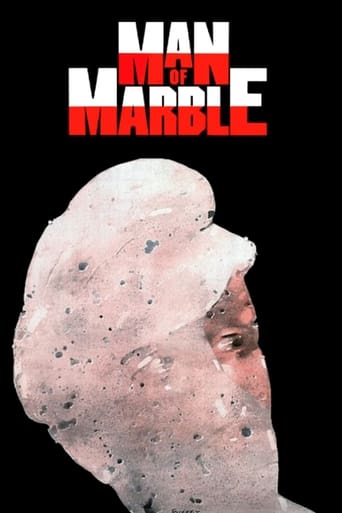

Ironic, tongue-in-cheek, smart and a tad too long, "Man of Marble" is a good movie that can't help being a little bit too much in love with itself, on top of being unable to know where to stop, thus ending being a little bit repetitive.Agnieszka, a university student doing her diploma film, decides to investigate in the past of long forgotten hero of the people Birkut. Her search brings her to discover a lot about a man that was put in a pedestal to then be forgotten and erased from the history of the nation.Wajda does not use a lot of subtlety in this film, but who needs it when the script is smart enough, the direction top notch, with some great shots and a pace that is sometimes close to an action movie, and there is really good acting (in particular our hero, Agnieszka, played with a lot of sass and confidence by Krystyna Janda). The score and the use of locations is also great.However, the movie clocks at over two hours and a half, and the ideas behind the movie: the use of unknown people by the ones in power as little more than toys, destroying lives and dreams without a second of remorse, the difficulty to fight the system or the way paranoia extends everywhere in some regimes become undone by repetition and by a story that starts to spin on its wheels around the 1 hour and a half mark.It is totally worth checking though. Just be sure to have enough time (you may want to have some breaks).
... View More"Czlowiek z marmuru" ("Man of Marble") goes to tells us the story of a filmmaker (Krystyna Janda) who wants to make as a film thesis a documentary about one of the heroes of Poland's communist regime, a simple man named Mateusz Birkut (Jerzy Radziwilowicz), a bricklayer who was famous for building housing for all the people, and that made him a cult figure in his country. She is trying to find Birkut, a popular figure that vanished without any explanation and she'll try to discover what happened with this mythic figure. Interviewing those who knew him and watching old footage of him, the filmmaker will make a great work about this man but her bosses who owns the funds (the Socialist government funds) for the film's realization are not very happy with her film, thinking that this might be a damaging project for them.If the story sounds a little like "Citizen Kane" well, be ready for countless flashbacks, back and forth in the past of Birkut, and an almost inconclusive ending just like Welles masterpiece. But wait! The ending of this journey appears in "Man of Iron" (1981), also directed by the great Andrzej Wajda. "Man of Marble" (term that refers to the propagandistic marble statues made in Birkut's image) is a powerful and brilliant story about the importance of past in the lives of everyone, it's the thing that makes us look for the future with better eyes, and in the film, we are constantly dragged down to it in order to get some answers about Birkut's future: Is he alive? Is he dead? Why he disappeared? Not just that, it is a great accomplish in showing how documentaries are made, both the protagonist work but the ones made up by the government, where Birkut and his friends were "trained" to appear important in front of camera. And, of course, a political and historical background that reveals many things about Poland and how strict the society were back in the 1950's and even in the 1970's with an absolute control on everything filmed, said and all. Unique in many senses, "Man of Marble" present us the sad reality of Communism with masked realities where everything presented as good but in the surface it wasn't all good, and Birkut realizes that after a painful incident and after the suspicion that his friend was a spy, something that he never agreed, and that made him fight with the ones who put him on a good position among people, the government.It is a well made film, with terrific performances by the cast, and a magnificent screenplay that knows how to evoke many times, many periods of Poland without being confusing (something that was problematic in its sequel), everything works fine. Bravo, Mr. Wajda. 10/10
... View MoreI came to this film after having watched Wajda's "Ashes and Diamonds," which I consider to be one of the finest films I have seen. However, "Man of Marble" was just too quirky for me, leaving me a bit perplexed. The story concerns a young film student, known here only as Agnieszka, who decides to produce a documentary on one Mateusz Birkut as her graduation project. Birkut was an idealistic bricklayer who rose to the status of post-WWII hero by way of displaying superior efficiency and strength. His innovation of how to use a small team to accomplish improved production came to be so well recognized that he would tour the country setting up such teams. The film time-slices from the 1970s, when Agnieszka is making her film, to previous times, all the way back to mock documentary footage of Birkut in the 1950s. The presentation is anything but flattering to the Communist Party and it is astounding the Wajda was able to get this made in a time when the Communists were still in power in Poland. The story must be autobiographical to some extent, since we see Agnieszka encountering political opposition to her digging too deeply into the past trying to reconstruct Birkut's life and figure out why he essentially dropped from the scene after having been so highly visible; there is also a famous film director in the movie whom we get to know well.There are many scenes that had the quality of a dream, but yet seemed like they were supposed to be taken for real. For example, one scene has Burkit's friend Witek going into a small office of a party boss and, when Burkit enters the office some time later there is no sign of Witek. If this were to be taken as some sort of Kafkaesque event, then Burkit would have made no remark on the mysterious disappearance, but he express the surprise that any normal person would have. I did not know what to make of such scenes. Agnieszka's facial expressions and body movements are often quite odd, bordering on the bizarre, and they accentuated the feeling of unreality I had that became increasingly more pronounced as the movie progressed.The collage of Agnieszka's interviews, mock documentary footage, scenes from Burkit's life, scenes from Agnieszka's own life, and an inappropriate musical score did not coalesce for me.
... View MoreI'm surprised that this great film hasn't gotten more comments. In any case, the previous reviews really nail the film pretty well. I only want to add that the filmmaker within the film, Agnieszka (played by Krystyna Janda), is such a fiercely dedicated artist that she really commands our attention in every scene she's in. Sneaky, smart, with a deep cunning and a sly sense of humor, she is the real hero of the film. I love the many scenes where she steals mischievous glances at her co-workers while collecting the provocative material for her film.Watch for the scene where she kicks her sound man in the shin. Also especially memorable is her encounter with a more successful film director, who she must persuade to be interviewed. She simply walks up to his car, bends down and looks in at him, with a blank expression on her face, and stares at him. It's as if she's persuading him by sheer force of will! Truly a great film, and a great performance.
... View More